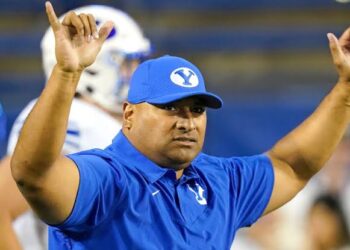“A New Era for College Football as Newly Elected Pope Pledges Support” — blending religious symbolism with sports enthusiasm in a fictional, engaging narrative.
A New Era for College Football as Newly Elected Pope Pledges Support
In an unprecedented moment blending faith and football, the newly elected Pope Francis II has sent shockwaves through both religious and athletic communities by publicly expressing his support for college football. During his first major address from the balcony of St. Peter’s Basilica, amid the traditional blessings and calls for unity, the Pontiff made a surprising pivot: “And may the joy of sport, especially college football, inspire our young people toward discipline, teamwork, and the glory of shared purpose.”
The crowd erupted—part stunned silence, part spirited cheer. Social media ignited within minutes. The hashtag #PapaforCollegeFootball trended globally, and prominent figures from both the Vatican and the NCAA scrambled to respond.
A Papal Touchdown
The Pope’s interest in college football, according to Vatican insiders, is not as sudden as it may seem. Born in Buenos Aires and educated in Rome, Francis II spent time in the United States as a young theology student, where he became fascinated by American culture—including its uniquely passionate college football tradition. A longtime fan of Notre Dame, he often cited the sport in homilies during his years as a bishop, using it as a metaphor for perseverance, sacrifice, and unity.
During his time as Archbishop of La Plata, he even organized friendly football matches among local seminaries, often playfully assigning teams based on American college mascots. His personal favorite? The Fighting Irish, naturally.
A Cultural and Spiritual Intersection
What does this mean for college football? The Pope’s endorsement is symbolic, yet powerful. His support does not favor one team or conference; rather, it reflects his vision of sport as a moral and cultural force. In a recent statement released by the Vatican’s Press Office, the Pope elaborated: “College football shows the beauty of community—students, alumni, families gathering in spirit and in song. It is an expression of healthy rivalry, of discipline, and of joy.”
This message resonates at a time when college sports are undergoing tremendous change. From debates over athlete compensation to conference realignments, the soul of college football is in flux. The Pope’s words arrive not just as unexpected support but as a call to restore the values that made the sport a national treasure.
Several prominent coaches have welcomed the endorsement. Alabama’s new head coach, Elijah Thomas, said, “It’s inspiring to see someone of such global influence remind us why we love this game. It’s more than Xs and Os. It’s about community and character.”
Notre Dame President Rev. John I. Jenkins, C.S.C., released a statement calling the Pope’s remarks “deeply moving,” adding, “The Holy Father has captured what many of us have long believed—that the traditions of college football, especially here at Notre Dame, can be a channel of grace and formation.”
A Vatican Bowl?
With excitement bubbling, rumors have begun to swirl about a potential “Vatican Bowl”—an exhibition game held in Rome featuring two major U.S. college teams, possibly with proceeds going toward charitable causes. Though the Vatican has not confirmed any such event, sports networks and university athletic directors have expressed early interest.
“This could be a historic moment,” said ESPN analyst Kirk Herbstreit. “Imagine a Notre Dame–USC game under the shadow of the Colosseum, with the Pope in attendance. That would be something the world has never seen.”
Indeed, it appears the Holy See is exploring how this support might manifest beyond words. Sources suggest the Pope may soon announce a new Vatican-based initiative aimed at promoting sportsmanship and youth engagement through international sports exchanges, with college football as a centerpiece.
Faith and Football: Compatible or Contradictory?
Naturally, the Pope’s involvement has sparked some theological debate. Critics worry that associating the Vatican with a highly commercialized sport may distract from spiritual priorities. Others are concerned about potential favoritism or the politicization of sport through religious influence.
However, many theologians have pushed back against such criticism. Dr. Maria Elena Bianchi, professor of religious ethics at the Pontifical Gregorian University, explained, “The Pope is not canonizing college football. He is affirming its potential as a human experience rich in virtue, camaraderie, and joy. He sees in it a metaphor for the Christian life: struggle, discipline, setbacks, and ultimate victory through faith.”
This sentiment was echoed by students at several Catholic universities, who say they feel seen and celebrated by the Pontiff’s gesture. “It’s amazing to think the Pope watches what we do on Saturdays,” said Taylor O’Connor, a theology major and cheerleader at Boston College. “It makes you want to play and live with even more heart.”
Global Ripples
The Pope’s endorsement may also inspire greater international interest in American college football. Already, the NCAA has reported increased global streaming activity, particularly from South America and parts of Europe, following the announcement. The fusion of Catholic identity and athletic enthusiasm is creating a new wave of cultural curiosity.
In a way, it parallels how Saint John Paul II used skiing and hiking as avenues to reach the youth—meeting them not just in church but in life. Francis II, with his affinity for football, may similarly be carving a new path for engagement.
Conclusion: A Game with Soul
At its core, the Pope’s embrace of college football is not about wins, trophies, or TV contracts. It is about people. It’s about how sport can reflect the divine rhythm of life—its trials and triumphs, its team spirit and transcendence.
As Pope Francis II said in closing his first Angelus message: “May we play the game of life as a team, lifting one another, honoring the rules, and striving always for what is good, true, and beautiful.”
And maybe—just maybe—cheering on a touchdown along the way
Would you like this turned into a social media post, press release, or adapted for a specific audience (like students or fans)?










